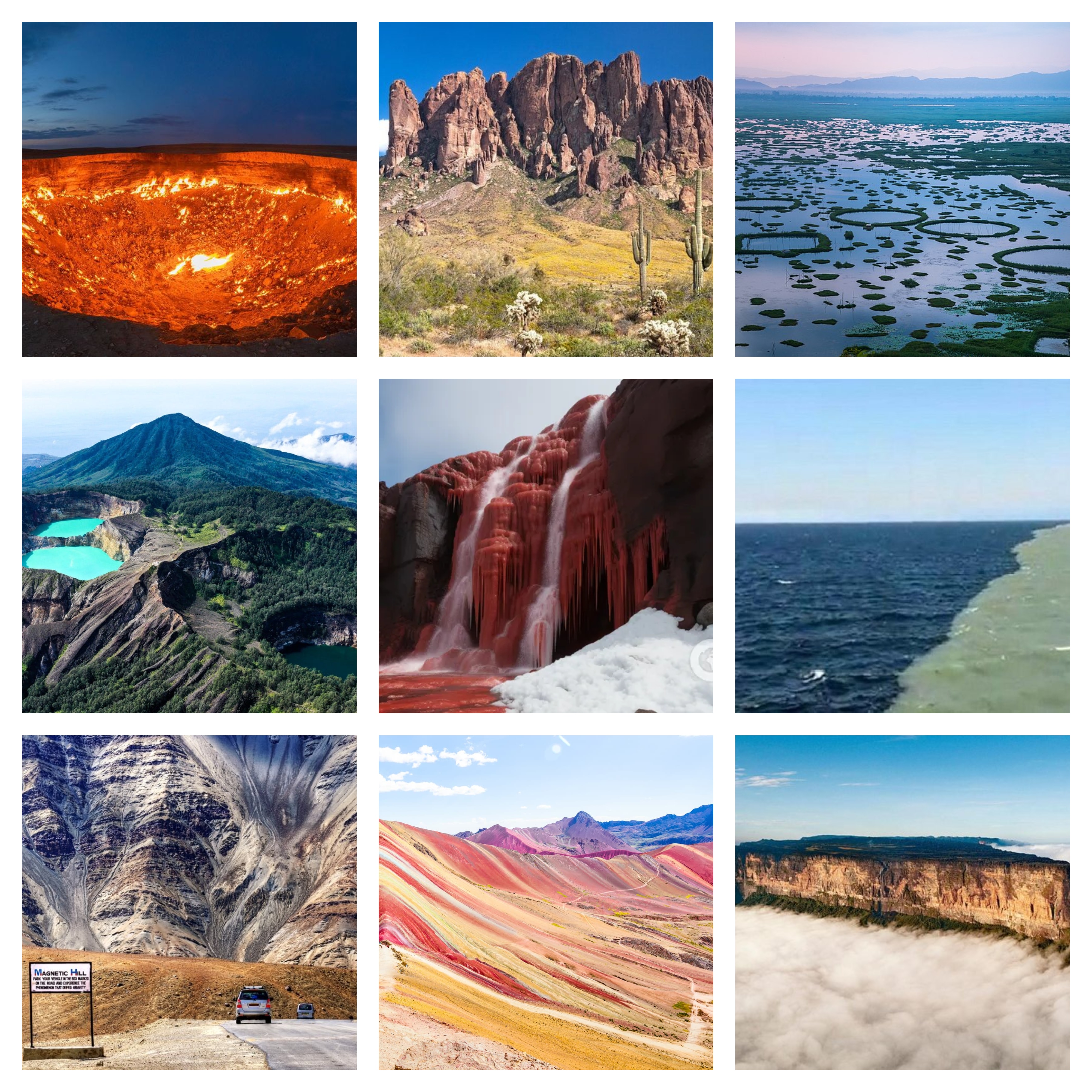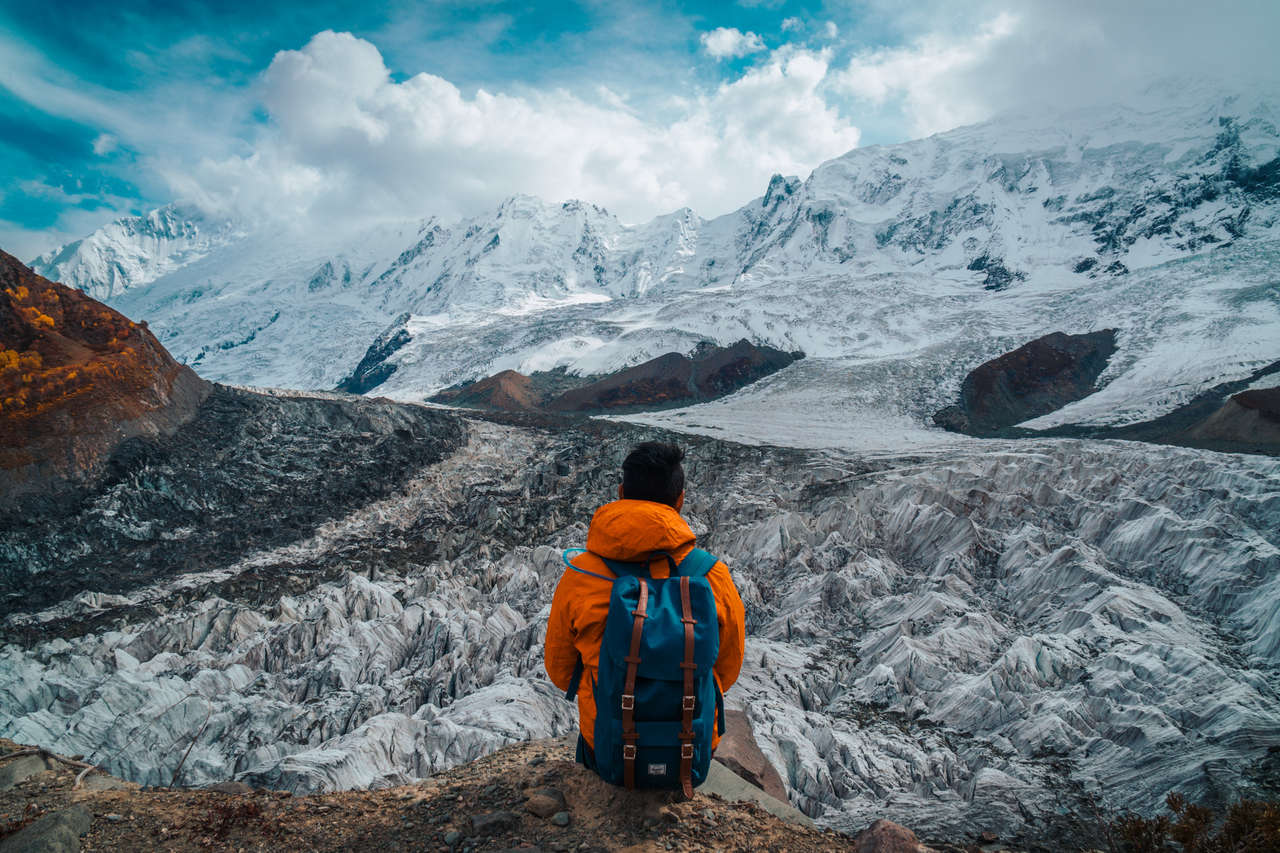
Article by
There is a certain enjoyment in being completely confused. It's a reason some of us travel, to be baffled, to be surprised, to be shocked, to look around at our foreign surroundings and have absolutely no idea what's going on. This weirdness that you notice while on the road comes in different guises. It can be quirks of culture, or it can be unique attractions. It can be natural, or it can be man-made. In some cases, it can be a complete mystery, to even those who claim it as their own. These places are really weird, and they're definitely worth seeing for yourself.
Mount Roraima
If we summarize this whole place in short, it's a completely different world, like that of a popular Hollywood movie, "Journey to the Mysterious Island." It has got everything to be called so. Besides the enormous flat-top mountain, it has a unique ecosystem, which includes various unusual species of plants and animals, along with waterfalls that are counted amongst the highest of their kinds in the world. Moreover, the mountain is considered to be around 2 billion years old. This beautiful landscape of Mount Roraima has also inspired movies and novels. The 2009 Pixar film "Up" and 1912 Conan Doyle's novel "The Lost World" are popular names amongst them. Indeed, one of the most mysterious spots for the daring.
Rama's Bridge (Adam's Bridge)
Rama's Bridge is a causeway created across the sea, connecting Pamban Island in Tamil Nadu to Mannar Island in Sri Lanka. Scientific studies have determined that the Palk Strait is a natural bridge formed by limestone shoals. However, according to Hindu mythology, it was built by Lord Rama with the help of the Vanara monkey army. He had to construct this bridge to reach Sri Lanka, as his wife Sita was kidnapped and imprisoned there. Surprisingly, the time of Ramayana (5000 BCE) and carbon dating analysis of the bridge sync properly. This causeway is visible from an aerial view even to this day. The whole issue of Rama's Bridge is mysterious, and that makes us talk about it even more. It is said that Rama's Bridge was above sea level. Even some historical records suggest that it was walkable until the 15th century. Even the estimated depth is around 3 to 30 feet in the area of this causeway. Even though Rama's Bridge is inside the water, ships cannot sail on it. The water here is shallow, with the level of depth varying at certain points. Hence, ships from India have to take another roundabout route to reach Sri Lanka. Ramayana mentions that the setu (bridge) was constructed with floating stones. Surprisingly, such floating stones are scattered across Rama's Swaram even to this day. What do you guys think? Is it man-made, or is it really constructed by Lord Rama and his monkey army? And if it's man-made, then how do you explain the floating stones?
Moving Mountain (Mountains of Sand)
Mountains aren't supposed to move, but a towering mountain of sand is doing just that, traveling at a pace of 20 meters (66 feet) each year. It's not just the massive dunes that move either. According to Tanzania's former President Jakaya Kikwete, a handful of the mountain's sand continued to move even after he transferred it to his car. Standing 10 meters (33 feet) tall by 100 meters (330 feet) wide, the crescent-shaped mountain of sand changes shape and direction every decade, at once even split in two and traveled in different directions. It's believed to be the product of a volcanic eruption. The Ngorongoro Conservation Area Authority uses beacons to track and predict the mountain's movements.
Magnetic Hill
Whether you are an avid traveler or a hardcore rider who loves to explore new trails on a bike, Ladakh in India is the name you will be familiar with. And since this tourist destination has a distinct hype amongst travelers, you must have also heard about the Magnetic Hills known to pull the vehicles. This magnificent hill lies on the way from Srinagar to Leh highway. Believe it or not, this small stretch of Magnetic Hill perfectly defines the phenomenon of gravity. To confirm the fact, you can turn off your car and, while on neutral, you will realize that your car is moving without your efforts at the speed of 12.5 miles per hour. However, there are many stories related to Magnetic Hill, some are superstitious. Interesting, isn't it?
Sea Splits Into Two (Corolla's Sea Split)
Faced a really tough time this year as the city witnessed the heaviest rains, which almost submerged the entire city underwater, taking the lives of thousands of people and making them homeless. After the water from the recent floods receded, something amusing happened in one of the cities of Kerala, which took everyone by surprise. The locals of Punani in Kerala's Malappuram witnessed a new island-like structure surfacing along their beach. The narrow sand strip, which is well over half a kilometer long, has literally split the sea into two. This is indeed a natural phenomenon, and everyone was surprised to see it. This has really gained a lot of attraction among the locals as well as the tourists, and people actually visit here to take a long walk on the sand strip, while tourists continue to flock to catch a glimpse of it. Authorities have warned that the sand strip could be washed away in the case of a high tide. Even though it was not immediately clear what was behind the formation of the unusual structure, people are still wondering how it happened. Well, till the mystery unveils, people are enjoying a walk on this, making it a memorable experience.
Blood Falls
Imagine a snowy mountain having a blood bath in between. Sounds like something unnatural, right? Well, here you have the blood-red waterfall staining the white Taylor Glacier, the Blood Falls of Antarctica. This may have been a mystery for quite a while, but it's not anymore, thanks to the researchers and glaciologists who said that this occurrence was due to iron oxide, basically rust, which was present in the water. Water which flows from the lake creates this red hue, making it look as if blood is flowing out into the water.
Kelimutu, Indonesia
In the island of Flores in Indonesia, Mount Kelimutu is the set of three pristine lakes in the national park of the same name. These lakes are the result of volcanic eruption and all are different colors: blue, turquoise, and even black. Well, if you are thinking that this is the mystery of the place, then you should hold on. These are one of those colors in which you can expect to see these lakes. Sometimes the color even changes to white or red because of the proximity of each lake to the underlying volcano. However, the change of their hue is unpredictable. Tourists have also seen one of these lakes in dark brown color. Unbelievable, right?
Floating Islands (Phumdis)
Loch Tok Lake is not only the largest freshwater lake in Northeast India but is also home to unique floating islands called Phumdis. These circular land masses are made of vegetation, soil, and organic matter that have been thickened into a solid form. The islands have a spongy surface that feels like a trampoline. Like an iceberg, most of the mass of the Phumdis lies below the water surface. During the dry season, when the water levels drop off, the living roots of the island can reach the lake bed and absorb nutrients. Speckled across this Loktak Lake, the several thousand Phumdis and its surrounding waters are vital for irrigation, drinking water, and food supplies. Thus, the lake has been referred to as the lifeline of Manipur State. Thousands of fishermen make their livelihood in the waters, catching about 1,500 tons (6.6 million pounds) of fish every year. Children and illiterate adults also attend a school located on one of the floating islands.
Superstition Mountain
Some places have long been thought to be simply no good, cursed, blighted, tainted, whatever you want to call it. Out in the remote Badlands of the US state of Arizona, just to the east of the Phoenix metropolitan area, lies a desolate, dried-up, arid moonscape of twisted peaks and sprawling, expansive Badlands called the Superstition Mountains. At one time, called the Sierra de la Espuma by Spanish settlers, legend of this place has it that a man named Jacob Waltz discovered a giant gold mine in these mountains back in the 19th century. He took the secret location with him to his grave, although there's speculation he may have told one other person on his deathbed. Since then, many expeditions to find the Lost Dutchman's Gold Mine have been launched, but all have proven deadly. Explorers have gone in and never come back out. Some Native Americans also believe the mountain holds the entrance to hell.
Turkmenistan Gates of Hell (Darvaza Crater)
The Darvaza Crater in Turkmenistan, better known as the Gates of Hell, is this eerie cavern in the Karakum Desert that has been on fire for more than 40 years. It was discovered in 1971 by Soviet geologists when the ground beneath their drilling rigs suddenly collapsed, leaving a 230-foot wide hole. As the huge crater was filled with potentially poisonous natural gas, the decision was made to set it alight. Scientists expected it to burn itself out within a few days, but it didn't. It's been more than 40 years ago, and the fire is still as fierce today as it ever was.


.jpg)

 Monthly "Azeem English Magazine", launched in 2000, records the information about diverse fields like mental health, literature, research, science, and art. The magazine's objective is to impart social, cultural, and literary values to society.
Monthly "Azeem English Magazine", launched in 2000, records the information about diverse fields like mental health, literature, research, science, and art. The magazine's objective is to impart social, cultural, and literary values to society.
+92 51 88 93 092
First Floor, RAS Arcade, Eidhi Market, Street#124, G-13/4, Islamabad, Pakistan, 44000.